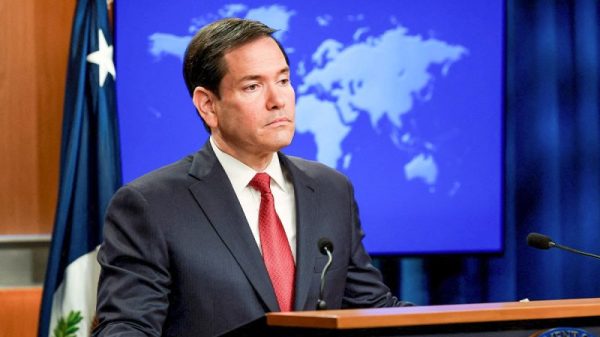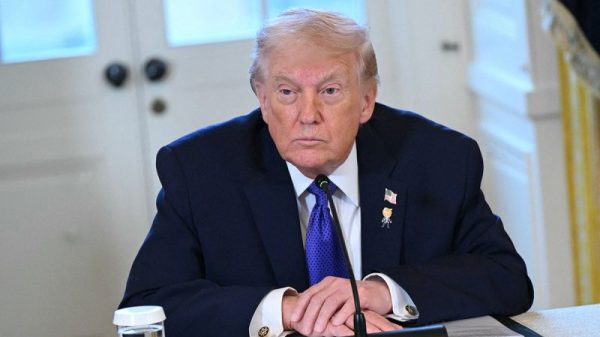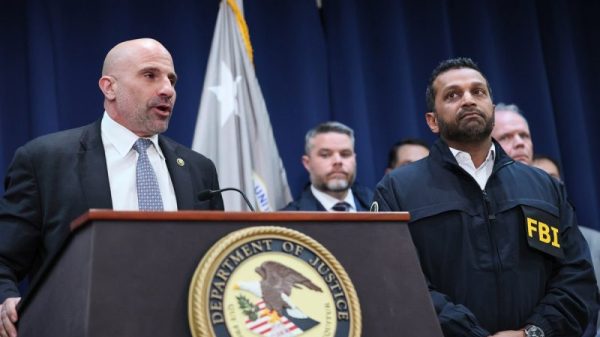Justice awaits Donald Trump for his effort to overturn the 2020 election. But even as his indictments have landed, we’ve seen some of the longest prison sentences yet for those wrapped up in his “big lie” alleging that election was stolen. The longest was handed down Tuesday in the case of former Proud Boys leader Henry “Enrique” Tarrio, who received a record 22-year sentence for seditious conspiracy.
Tarrio and other high-profile defendants involved in the storming of the Capitol on Jan. 6, 2021, have often confronted their legal fate by pointing a finger at Trump. Tarrio’s lawyer called his client a “scapegoat for Donald J. Trump and for those in power.” A lawyer for fellow Proud Boy Joseph Biggs said that the group’s “commander-in-chief” — Trump — “sold them a lie.” A lawyer for a third Proud Boy, Zachary Rehl, argued that “certainly believing the commander-in-chief and heeding his call should yield some measure of mitigation” in Rehl’s sentencing.
All told, well over 100 Jan. 6 defendants have cited Trump’s role in their actions. That should certainly be viewed as the blame-shifting legal strategy that it is. But it does appear to have some merit, given that Trump’s claims of massive voter fraud were demonstrably false and were a necessary component of that day’s events.
Certainly Trump can share some blame when it comes to the huge toll exacted on people’s lives.
The sentences over the past week — including 22 years for Tarrio, 17 for Biggs and 15 for Rehl — bring the total number of years of incarceration in Jan. 6 sentences to about 700, according to a Washington Post review of Justice Department data.
More than 350 people have been sentenced to jail or prison time, with an average sentence of just less than two years.
Some other numbers:
10 people — most of them Proud Boys or members of the far-right Oath Keepers — have been sentenced to at least a decade in prison.More than a dozen people (also mostly members of those extremist groups) have been convicted of or pleaded guilty to seditious conspiracy — a crime that hadn’t been proved in federal court since the 1990s.About 160 people have been sentenced to at least a year in prison.More than 80 people have been sentenced to a month or less, with the shortest sentences being one week.
Trump is not charged specifically with inciting people to riot on Jan. 6, which is the alleged offense the Democratic-controlled House impeached him for. Nor is he accused of seditious conspiracy, as Tarrio and the others were. But Trump is charged with somewhat similar crimes, including running a criminal enterprise (as alleged in Georgia) and conspiring both to defraud the United States and to deprive people of their right to have their votes count (in federal court). In his federal indictment, he also faces a charge used against many Jan. 6 defendants: obstruction of an official proceeding — with the official proceeding being Congress’s counting of electoral votes that day.
Trump’s having played at least some role in so many people going to prison for so many years has thus far been treated gingerly by his fellow Republicans. That’s in part because they’ve shied away from judging his actions too harshly for fear of alienating the Trump-backing base.
But for a time recently, Florida Gov. Ron DeSantis’s campaign toyed with the idea of attacking Trump on these terms.
A spokeswoman for DeSantis (R) repeatedly advanced the idea that Trump had landed supposedly unsuspecting people in prison. One post she promoted accused Trump of “a multi-year grift based on a lie that bilked millions of Trump supporters out of more than $250 million of their hard-earned money and got hundreds jailed.”
Trump has repeatedly floated the idea that he would pardon Jan. 6 defendants, pledging last year that he would offer “full pardons with an apology to many.” Exactly how many, it’s not clear, nor is it clear that he would pardon the likes of the Proud Boys — which would be an especially historic decision given the gravity and nature of their crimes. (Biggs said recently from prison: “Oh, I know he’ll pardon us. I believe that with all my heart.”)
That would certainly fit a trend. Trump has wielded his pardon power in highly political ways, often obviously rewarding allies for their loyalty. Trump pardons and commutations knocked nearly 11 years off sentences for Paul Manafort (financial crimes), Roger Stone (obstruction), and former Republican congressman Chris Collins of New York (insider trading), and he also pardoned Elliott Broidy (illegal lobbying) and Michael Flynn (lying to the FBI) before they could be sentenced. Almost always, Trump referred to the idea that those allies were treated “unfairly” by the justice system.
That’s a justification he’s already floating for potential pardons of the many Jan. 6 defendants. And in part because of his quixotic quest to overturn the 2020 election, the number of years he could shave off his allies’ prison sentences could rise dramatically come 2025.
Justice awaits Donald Trump for his effort to overturn the 2020 election. But even as his indictments have landed, we’ve seen some of the longest prison sentences yet for those wrapped up in his “big lie” alleging that election was stolen. The longest was handed down Tuesday in the case of former Proud Boys leader Henry “Enrique” Tarrio, who received a record 22-year sentence for seditious conspiracy.
Tarrio and other high-profile defendants involved in the storming of the Capitol on Jan. 6, 2021, have often confronted their legal fate by pointing a finger at Trump. Tarrio’s lawyer called his client a “scapegoat for Donald J. Trump and for those in power.” A lawyer for fellow Proud Boy Joseph Biggs said that the group’s “commander-in-chief” — Trump — “sold them a lie.” A lawyer for a third Proud Boy, Zachary Rehl, argued that “certainly believing the commander-in-chief and heeding his call should yield some measure of mitigation” in Rehl’s sentencing.
All told, well over 100 Jan. 6 defendants have cited Trump’s role in their actions. That should certainly be viewed as the blame-shifting legal strategy that it is. But it does appear to have some merit, given that Trump’s claims of massive voter fraud were demonstrably false and were a necessary component of that day’s events.
Certainly Trump can share some blame when it comes to the huge toll exacted on people’s lives.
The sentences over the past week — including 22 years for Tarrio, 17 for Biggs and 15 for Rehl — bring the total number of years of incarceration in Jan. 6 sentences to about 700, according to a Washington Post review of Justice Department data.
More than 350 people have been sentenced to jail or prison time, with an average sentence of just less than two years.
Some other numbers:
10 people — most of them Proud Boys or members of the far-right Oath Keepers — have been sentenced to at least a decade in prison.More than a dozen people (also mostly members of those extremist groups) have been convicted of or pleaded guilty to seditious conspiracy — a crime that hadn’t been proved in federal court since the 1990s.About 160 people have been sentenced to at least a year in prison.More than 80 people have been sentenced to a month or less, with the shortest sentences being one week.
Trump is not charged specifically with inciting people to riot on Jan. 6, which is the alleged offense the Democratic-controlled House impeached him for. Nor is he accused of seditious conspiracy, as Tarrio and the others were. But Trump is charged with somewhat similar crimes, including running a criminal enterprise (as alleged in Georgia) and conspiring both to defraud the United States and to deprive people of their right to have their votes count (in federal court). In his federal indictment, he also faces a charge used against many Jan. 6 defendants: obstruction of an official proceeding — with the official proceeding being Congress’s counting of electoral votes that day.
Trump’s having played at least some role in so many people going to prison for so many years has thus far been treated gingerly by his fellow Republicans. That’s in part because they’ve shied away from judging his actions too harshly for fear of alienating the Trump-backing base.
But for a time recently, Florida Gov. Ron DeSantis’s campaign toyed with the idea of attacking Trump on these terms.
A spokeswoman for DeSantis (R) repeatedly advanced the idea that Trump had landed supposedly unsuspecting people in prison. One post she promoted accused Trump of “a multi-year grift based on a lie that bilked millions of Trump supporters out of more than $250 million of their hard-earned money and got hundreds jailed.”
Trump has repeatedly floated the idea that he would pardon Jan. 6 defendants, pledging last year that he would offer “full pardons with an apology to many.” Exactly how many, it’s not clear, nor is it clear that he would pardon the likes of the Proud Boys — which would be an especially historic decision given the gravity and nature of their crimes. (Biggs said recently from prison: “Oh, I know he’ll pardon us. I believe that with all my heart.”)
That would certainly fit a trend. Trump has wielded his pardon power in highly political ways, often obviously rewarding allies for their loyalty. Trump pardons and commutations knocked nearly 11 years off sentences for Paul Manafort (financial crimes), Roger Stone (obstruction), and former Republican congressman Chris Collins of New York (insider trading), and he also pardoned Elliott Broidy (illegal lobbying) and Michael Flynn (lying to the FBI) before they could be sentenced. Almost always, Trump referred to the idea that those allies were treated “unfairly” by the justice system.
That’s a justification he’s already floating for potential pardons of the many Jan. 6 defendants. And in part because of his quixotic quest to overturn the 2020 election, the number of years he could shave off his allies’ prison sentences could rise dramatically come 2025.





















